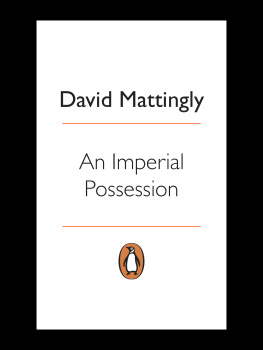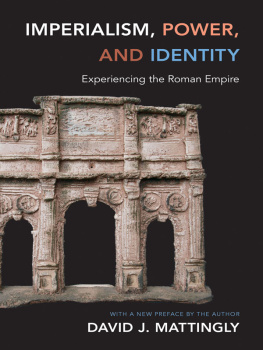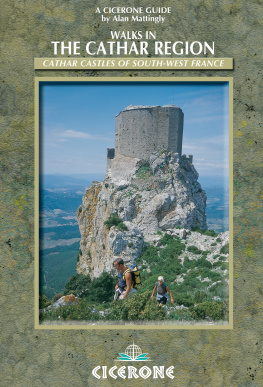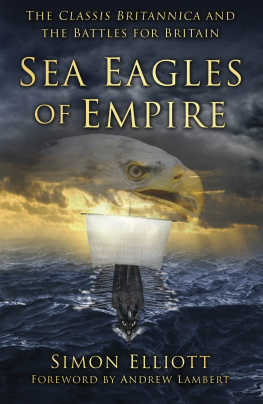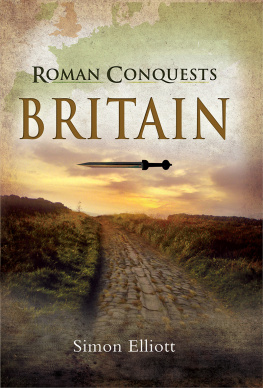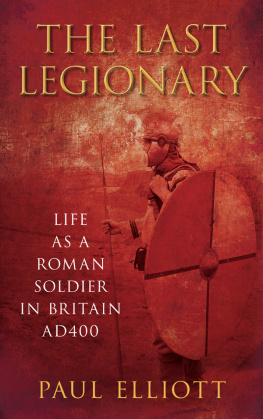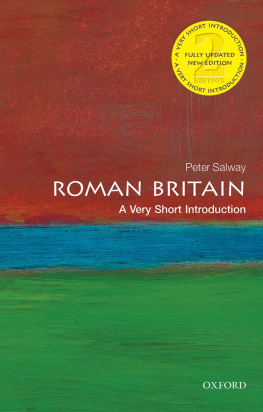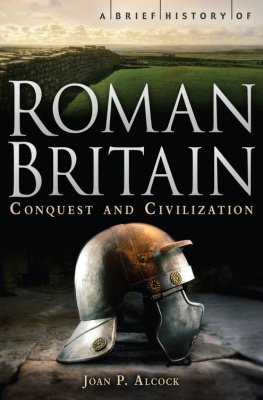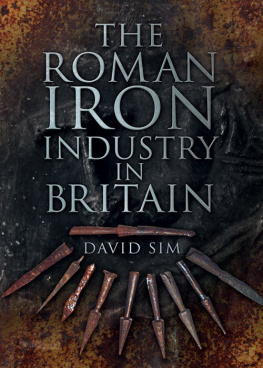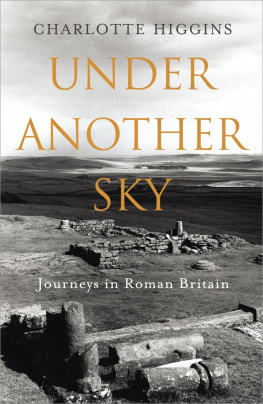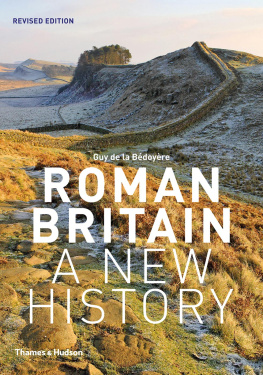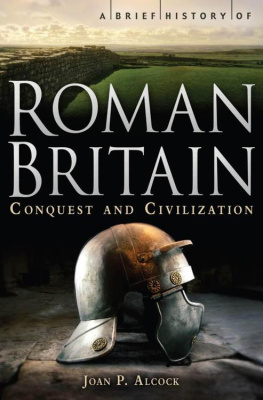PENGUIN BOOKS
THE PENGUIN HISTORY OF BRITAIN
GENERAL EDITOR: DAVID CANNADINE
AN IMPERIAL POSSESSION
David Mattingly is Professor of Roman Archaeology in the School of Archaeology and Ancient History at the University of Leicester, having held previous university appointments at the University of Michigan and the University of Oxford, where he was a British Academy Post-Doctoral Fellow. His research focuses on the archaeology of the Western Roman Empire and he has carried out fieldwork in Libya, Tunisia, Jordan, Italy and Britain. His publications include An Atlas of Roman Britain (co-author); Tripolitanis; Farming the Desert: The UNESCO Libyan Valleys Archaeological Survey. Vols 1-2 (co-author); Dialogues in Roman Imperialism (editor); Leptiminus (Lamta: A Roman Port Town in Tunisia, Reports 1-2 (co-author); Life, Death and Entertainment in the Roman Empire (co-editor); Economies beyond Agriculture in the Classical World (co-editor); and The Archaeology of Fazzan. He is a Fellow of the British Academy and a Fellow of the Society of Antiquaries, London.
THE PENGUIN HISTORY OF BRITAIN
Published or forthcoming
I: DAVID MATTINGLY Roman Britain 100-409
II: ROBIN FLEMING Anglo-Saxon Britain: 410-1066
III: DAVID CARPENTER The Struggle for Mastery: Britain 1066-1314
IV: MIRI RUBIN The Hollow Crown: Britain 1272-1485
V: SUSAN BRIGDEN New Worlds, Lost Worlds: Britain 1485-1603
VI: MARK KISHLANSKY A Monarchy Transformed: Britain 1603-1714
VII: LINDA COLLEY A Wealth of Nations? Britain 1707-1815
VIII: DAVID CANNADINE The Contradiction of Progress: Britain 1800-1906
IX: PETER CLARKE Hope and Glory: Britain 1900-2000
DAVID MATTINGLY
An Imperial Possession
Britain in the Roman Empire,
54 BC-AD 409

PENGUIN BOOKS
PENGUIN BOOKS
Published by the Penguin Group
Penguin Books Ltd, 80 Strand, London WC2R 0RL, England
Penguin Group (USA) Inc., 375 Hudson Street, New York, New York 10014, USA
Penguin Group (Canada), 90 Eglinton Avenue East, Suite 700, Toronto, Ontario, Canada M4P 2Y3
(a division of Pearson Penguin Canada Inc.)
Penguin Ireland, 25 St Stephens Green, Dublin 2, Ireland
(a division of Penguin Books Ltd)
Penguin Group (Australia), 250 Camberwell Road, Camberwell, Victoria 3124, Australia
(a division of Pearson Australia Group Pty Ltd)
Penguin Books India Pvt Ltd, 11 Community Centre, Panchsheel Park, New Delhi - 110 017, India
Penguin Group (NZ), 67 Apollo Drive, Rosedale, North Shore 0632, New Zealand
(a division of Pearson New Zealand Ltd)
Penguin Books (South Africa) (Pty) Ltd, 24 Sturdee Avenue, Rosebank, Johannesburg 2196, South Africa
Penguin Books Ltd, Registered Offices: 80 Strand, London WC2R 0RL, England
www.penguin.co.uk
First published by Allen Lane 2006
Published in Penguin Books 2007
1
Copyright David Mattingly, 2006
Maps copyright J. E. Skinner and David Mattingly, 2006
All rights reserved.
The moral right of the author has been asserted
Except in the United States of America, this book is sold subject
to the condition that it shall not, by way of trade or otherwise, be lent,
re-sold, hired out, or otherwise circulated without the publishers
prior consent in any form of binding or cover other than that in
which it is published and without a similar condition including this
condition being imposed on the subsequent purchaser
EISBN: 9780141903859
For the Harolds
Figures and Tables
. Britain and the Roman empire in the mid-second century.
. Map of the British archipelago.
. Peoples of Britain, including Ireland, in the Roman period.
. Southern Britain in the late Iron Age.
. Changing garrison patterns in Britain under Roman military occupation.
. Military sites in southern Britain.
. Military sites in northern Britain.
. Hadrians Wall and the Antonine Wall.
. The province of Britannia and its sub-divisions.
. The main towns and peoples of Britain.
. The road network, major towns, small towns and garrison settlements.
. Rural settlement in southern Britain.
. Rural settlement of Roman date in the East Midlands.
. The villa landscape of the West Country.
. Rural settlement and (inset) Roman material culture in northern Britain.
. Ireland in the late Iron Age/Roman period.
. Comparative distributions of villas and Romano-Celtic temples.
. Key dates in Roman history and of Britain in the Roman world.
. Main campaigns and battles of the conquest phase.
. Wars and revolts, 84211.
. Civil wars and secession, late first to late second century.
. Religious dedications from Vindolanda.
. Wars, civil wars and revolts in Britain, 235409.
. The army of Britain in the Notitia Dignitatum.
. The Antonine Itinerary and the connectivity of towns in Roman Britain.
. The current state of archaeological knowledge of the principal Roman urban sites in Britain.
. Inscriptions recording public benefactions in British towns and small towns.
. Curse tablets from Britain.
. Urban defences in Roman Britain.
. The main phases of construction of urban defences.
. Religious identity in Britain defined by differences in practice.
Preface
The Pelican Histories of England were landmarks in the field and have served their reading audience well through the second half of the twentieth century. As I sit typing the final words of my own book, I am very conscious of the fact that Ian Richmonds Roman Britain was published in 1955, exactly fifty years ago, and, with revisions, has remained in print ever since. The story of Roman Britain has been written many times; indeed, perhaps too often and rarely with the verve or insight of Richmond. Consequently, and like other writers in this new series, I have felt humbled and daunted by the task of writing an account for the twenty-first century. Over recent decades Britain has become one of the most heavily researched provinces of the Roman empire, but this in itself makes the task of synthesis ever more difficult. Another challenge has been to address the subject as a history of Britain, rather than of the limited south-eastern part of the archipelago. Every telling of history is a product of its age and while Richmonds account was from the twilight zone of the modern colonial period, my perspective has been built up in a much more sceptical post-colonial world, where empires are no longer assumed to have been benign civilizing powers. The realities of Britains status as an imperial possession are not all comfortable ones for modern readers schooled on a vision of Roman imperialism as essentially a civilizing force for good.
Writing this book has taken me far longer than Penguin or I anticipated (and here I must acknowledge the patience and persistence of my editors David Cannadine and, most directly, Simon Winder). The delay in part reflects the explosion of new publication in the last decade, and in part my determination to bring a freshness of approach in comparison with what has become a rather jaded format in some of the rival books on Roman Britain. In short, I have tried to write a controversial book, but one that will be accessible to a wide audience, a book that will make people think for themselves about issues, and that does not always have clear answers to difficult questions. In the process I have tried to dispense with a series of sacred cows most notably the intellectually lazy recourse to the concept of Romanization (which ultimately means everything and nothing). In place of Romanization, I offer a framework of analysis based on three broad groups of provincial society (military, urban and rural communities) and the diverse identities that they gave rise to in responding to the challenges and opportunities of Roman rule.
Next page
